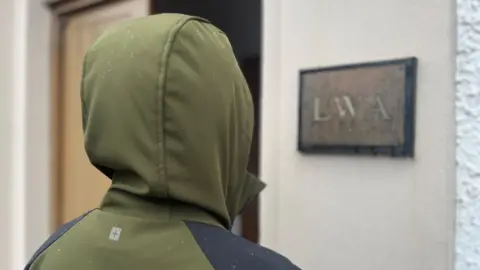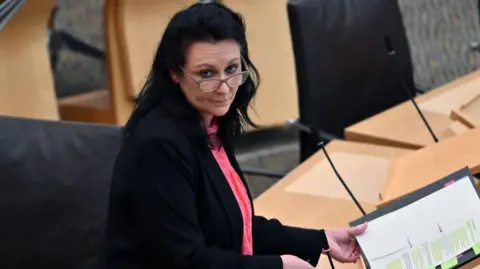Divorce case turned down by 116 legal aid lawyers
 BBC
BBCA woman who was assaulted by her husband was unable to find a legal aid lawyer to handle her divorce - despite asking more than 116 law firms to take on the case.
The mother-of-two, from the Highlands, said none of the companies were willing or able to work with her.
Her struggle highlights the challenges facing the system, with the Law Society of Scotland claiming a third of legal aid lawyers are due to retire over the next decade.
The Scottish government minister responsible for legal aid described her plight as "unacceptable" and promised reforms were on the way.
The woman, who asked not to be named, qualified for state assistance because she was on universal credit and readily admits her case involved complex issues which would take time to resolve.
She says some firms turned her down because she lives in the Highlands, while others said they were no longer taking civil legal aid cases. Some did not reply or give a reason.
"It made an extremely difficult, traumatic experience that much harder to deal with," the woman told BBC Scotland News.
"To get constant rejections just left me in an even deeper pit of despair and despondency."
The woman contacted 116 solicitors, who were listed on the Scottish Legal Aid Board website, by phone and email while a friend approached others on her behalf.
Applications for legal aid are made through solicitors. Her inability to find a lawyer meant she could not ask for the help she was entitled to receive.
After weeks of getting nowhere, the woman was able to appoint a lawyer thanks to donations from friends - but her financial position remains precarious and her future far from certain.
"I'm still not out of the woods yet and it might come to the point where I won't have any representation and I don't know what I'll do," she said.
Lochaber Women's Aid in Fort William says it's common for local survivors of domestic abuse to have difficulty securing civil legal aid.
The agency's deputy manager Donna Campbell said: "Some of them are being told they'll have to represent themselves in family court.
"The women I deal with are scared. They're scared for themselves, they're scared for their children.
"It's incredibly important to them that this gets addressed."
'Trauma and safety concerns'
According to the Scottish Women's Rights Centre, survivors typically contact between 30 and 50 solicitors before they secure representation.
The centre's senior associate Lyndsay Fleming says this is causing "trauma and safety concerns".
"Survivors are being told by police, you need to go and get a civil protective order, like a non-harassment order against the perpetrator.
"If they don't have that protection from the criminal justice system and they don't have a civil protective order, they're left alone and at serious risk of injury and harm."
In Orkney, the number of lawyers registered for civil aid cases is said to have fallen from nine in 2000 to just one in 2025.
Michelle Ward from Women's Aid Orkney says some women are forced to stay in harmful situations because they have no way of getting out of them.
"It's a huge issue in rural areas," she said. "Of the 152 women we supported last year, 24 left because they didn't feel safe in their own community."
She believes difficulty in securing civil legal aid was a factor in half of those cases.
 Getty Images
Getty ImagesDiscontent over legal aid has been building in the profession for many years.
The Law Society of Scotland claims there is a real possibility the system could face "complete collapse" because payments are too low.
The convenor of the society's civil legal aid committee, Pat Thom, said: "The solicitors who have been doing it for 20 years are dropping out because it's not financially sustainable and the younger solicitors aren't going into it because it's not very appealing.
"It's not that they want to drive about in Jaguars; they need to make enough to run their office and pay their staff."
The minister for victims and community safety, Siobhian Brown MSP, said she was "really sorry" to hear about the woman's struggle to find a lawyer.
"That's why we need to make sure people can access justice," she said.
"I'm aware that there are gaps geographically around Scotland."
Ms Brown said Scottish legal aid was "one of the most generous systems in the world" with fees reaching a record £171m this year - although she accepted that had been caused in part by an increase in the number of cases going through the courts.
"There has been a 25% uplift in fees since 2019 and it doesn't seem to be alleviating the problem of solicitors not wanting to take up legal aid," she said.
"It's not just about throwing money at it because we've been doing that the last couple of years."
'Potential for change'
She said the Scottish government was preparing to propose reforms which could be brought in before the next Holyrood elections in 2026, while in the longer-term legislation would be required to modernise the system.
The Scottish Legal Aid Board says hundreds of lawyers are working in criminal and civil legal aid nationwide but there may be "pockets" where they are harder to access.
Chief executive Colin Lancaster said there were specific issues which required solutions and there would be "real benefits" in simplifying and streamlining a complex system.
"I don't think the evidence suggests there's an overall crisis," he said.
"The system is not as flexible as we would like it to be. The traditional method of delivering legal aid is very much rooted in the 1950s.
"There's definitely potential for change that would improve the way the system can respond to changes in need."
